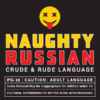Russian way to use NO
You might have noticed already that Russians tend to use ‘no’ more often than other language speakers do. In this episode we are going to reflect on it. Besides, you’ll learn some interesting expressions that will definitely make your Russian sound more natural. Listen and learn real Russian with today’s episode of the very much Russian podcast! 🙂
Всем здра́вствуйте!
Hello everyone!
Иде́я написа́ть э́тот пост посеща́ла меня́ дово́льно ча́сто в тече́ние до́лгого вре́мени, пока́, наконе́ц, разро́зненные мы́сли са́ми собо́й не сложи́лись в бо́лее и́ли ме́нее чита́емый текст. Ита́к, поговори́м о ру́сском нет.
The idea to write this post has been visiting me quite often for a while, until finally, the scattered thoughts didn’t form themselves into a more or less readable text. So, let’s talk about the Russian “no”.
Как вы (возможно) зна́ете, я изуча́ю и соверше́нствую четы́ре иностра́нных языка́ (англи́йский, испа́нский, францу́зский и иврит). Я могу́ ошиба́ться, и тогда́, носи́тели языко́в поми́мо ру́сского, пожа́луйста, попра́вьте меня́, но ни в одно́м друго́м языке́ я не встреча́ла тако́й тя́ги к испо́льзованию отрица́тельной части́цы.
As you know, I’m learning and practicing four foreign languages (English, Spanish, French and Hebrew). I can be wrong, and then speakers of languages other than Russian please correct me, but in no other language have I encountered such a tendency to use the negative particle.
Возьмём приме́р из уче́бника… Допу́стим, вы хоти́те обрати́ться к незнако́мому челове́ку с про́сьбой подсказа́ть вам доро́гу. Что вы ска́жете?
Let’s take an example from a textbook … Let’s say you want to address a stranger with a request to tell you the way. What do you say?
Извини́те, вы могли́ бы подсказа́ть, как быстре́е всего́ добра́ться до аэропо́рта?
Excuse me, could you tell me what’s the fastest way to get to the airport?
Ан нет! Для ру́сского бо́лее есте́ственным спо́собом бу́дет испо́льзовать не:
But no! For a Russian, the more natural way is to use “not”:
Извини́те, вы НЕ могли́ бы подсказа́ть, как быстре́е всего́ добра́ться до аэропо́рта?
Excuse me, could NOT you tell me what’s the fastest way to get to the airport?
Возьмём другу́ю ситуа́цию: вы возвраща́етесь домо́й с рабо́ты и обнару́живаете, что ваш дома́шний люби́мец (допу́стим, пу́дель по и́мени Ва́ся) съел ваш та́пок. Есте́ственно, вы разозли́лись:
Let’s take another situation: you come home from work and find that your pet (say, a poodle named Vasya) ate your sneakers. Naturally, you are angry:
Нет, ну ты посмотри́! Ты что натвори́л, засра́нец?
No, you look at it! What have you done, bastard?
Начина́ть фра́зу с нет и́ли не вообще́ дово́льно сво́йственно ру́сским, да́же е́сли они́ по́лностью согла́сны с обсужда́емой те́мой. Одна́жды я была́ свиде́телем приме́рно тако́го разгово́ра трои́х челове́к:
To start a phrase with “no” or “not” is generally quite peculiar to Russians, even if they completely agree with the discusses matter. Once I witnessed a conversation of three people that sounded about like that:
– Нет, всё-таки согласи́тесь, мы отли́чно прово́дим вре́мя!
– Не, действи́тельно кру́то. Я давно́ так хорошо́ не отдыха́ла.
– Не, я́ с удово́льствием прие́ду сюда́ ещё раз.
– No, you have to agree, we are having a great time!
– No, really cool. I haven’t had such a good vacation for a while.
– No, I’ll come here again with pleasure.
Причём ни оди́н из трои́х не пыта́лся спо́рить друг с дру́гом, все бы́ли абсолю́тно единоду́шны. И никто́ да́же не заме́тил, что вме́сто “да, э́то действи́тельно так”, начина́л свою́ фра́зу с “нет”.
And none of the three did not try to argue with anybody, all of them were absolutely unanimous. And no one even noticed that instead of “yes, it really is so”, he began his phrase with “no”.
Впро́чем, приме́рно похо́же де́ло обстои́т и с ру́сским да. Да, как вы зна́ете, э́то не то́лько да, но и части́ца, испо́льзуемая для прида́ния эмоциона́льной окра́ски предложе́нию. Наприме́р:
However, something similar happens to the Russian “да”. “Да”, as you know, it is not only a “yes”, but also a particle used to give an emotional color to the sentence. For example:
Да нет же! Всё не так, говорю́ я вам!
But no! It’s not like that, I’m telling you!
Да как же так? Как э́то могло́ произойти́?
But how is it? How could this happen?
Да ну! Что, пра́вда что-ли?
Come on! What, really?
Да не мо́жет тако́го быть!
But this just can’t be!
И пусть вас не вво́дит в заблужде́ние совме́стное испо́льзование да и нет, как в пе́рвом приме́ре. В таки́х слу́чаях э́то однозна́чное нет.
And do not be misguided by the use of “yes” and “no” together, as in the first example. In such cases, this is an unambiguous “no”.
Ру́сский язы́к, коне́чно, вели́кий и могу́чий, как сказа́л Тургенев, но кро́ме того́ он ещё и зага́дочный и необъясни́мый. Что де́лает его́ ещё бо́лее привлека́тельным, вы не нахо́дите?
The Russian language is, of course, great and mighty, as Turgenev said, but in addition it’s also enigmatic and inexplicable. What makes it even more attractive, don’t you think?
На э́том всё на сего́дня. Хоро́шей вам неде́ли и до ско́рой втречи!
That’s it for today. Have a good week and see you soon!
Subscribe to our basic newsletter and receive notifications about new episodes of Very Much Russian podcast.
Or subscribe to our premium newsletter to receive both the basic newsletter and all our previous podcast episodes, one by one, on a regular basis.
Today's vocabulary
- да нет!
Russian exclamations[da nyet]Well no! Not at all! Nothing of the kind! - да ну!
Russian exclamations[da nu]Is that right? Really? - да не может быть!
Russian exclamations[da nye MO-zhet byt']That's impossible! That cannot happen! - да как же так?
Russian exclamations[da kak zhe tak]How can that be?










11 comments on “Russian way to use NO”
Asaad Debs says:
Hello, have a nice day,
if you don’t bother, please tell me if “tapok” means dinner or something like that ?
Thanks .
Очень по-русски says:
Hello Asaad,
Тапки means ‘home shoes’. Тапок is one of them.
Like this: тапки
Sami Akl says:
We need some coruses for absolute beginners please !
Очень по-русски says:
Hello Sami Akl,
There is a lot of sites for beginners in Russian. This site is just not one of them.
lewis says:
Plenty of other places for that.. stop making demands of people
Jeannie says:
Valeria, your site and blogs are WONDERFUL! I’m so glad I found Очень по-русски today. I would only encourage you to stay with your conviction that language – очень уважаемая вещь! Even though all around people use slang and foul words, we need people like you to make a huge difference in helping our countries and refuse to use them. Even as you fill a great need for Russian language help, we need you to give us only the best. I say this all with much respect. Your work is wonderful! I look forward to learning much from you. Thank you.
Очень по-русски says:
Hello Jeannie,
Many thanks for your comment.
I mostly agree with you. There is a quote I like very much: The limits of my language mean the limits of my world. (Ludwig Wittgenstein).
But this concerns slang as well. Very often slang is sharp and witty. Sometimes it infiltrates so deep in our life so you even don’t understand if it’s slang or a normal word… People just shouldn’t limit their speech with only one side of the language, and they should use the words accordingly the circumstancies. This is just my opinion. 🙂
Thanks a lot one more time for your kind words about my work which I really enjoy. 🙂
lewis says:
If you don’t want to learn rough words, then don’t learn them. Don’t try to stop other people learning them.
Thanks
lewis says:
Great site !! Soo useful, just what I need after learning from books and newspapers : ) “Formal” russian is everywhere, but slang and “swearing” is harder to find and learn.
Glad to see your sensible attitude and response to people who can’t cope with “swearing”.
I don’t intend to swear much in Russian, but it’s essential to know these words and recognise them in everyday life. As a foreigner, I need to know if someone is swearing at me : )
Thanks again, your work here is great!
Очень по-русски says:
Hi Lewis,
Thanks for your comment,I’m really glad when people find my work useful.
You’re right about swearing. There is a lot of swearing everythere so there is no need to multiply it.
Feel free to leave your questions and suggestions. Good luck! 🙂
Nedim Yapar says:
нет, это было очень полезно тема!